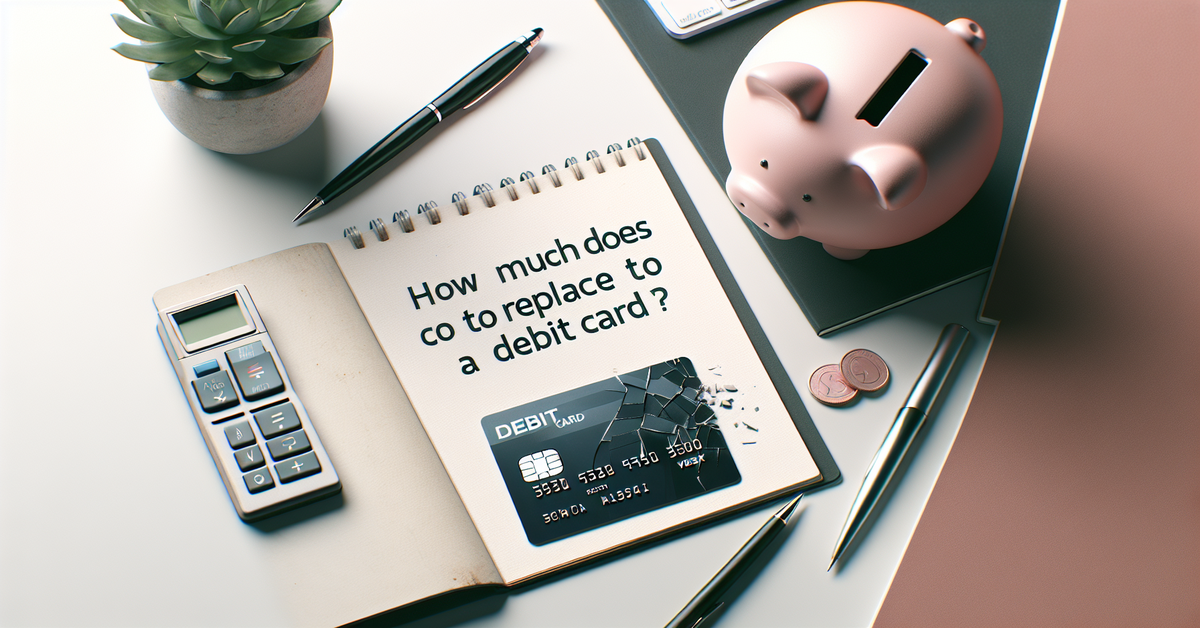When you find yourself needing to replace a debit card, the costs can range considerably, often between $5 and $30. However, factors like your bank's policies, the type of account you hold, and even your location can all influence what you'll actually pay. Some banks might even offer free replacements under certain conditions. But what if you need that card urgently? The fees can escalate quickly. Understanding these nuances can help you navigate the process more effectively, especially when unexpected situations arise. So, what should you know to avoid unnecessary expenses?
Understanding Debit Card Replacement Fees
When it comes to replacing your debit card, understanding the associated fees can help you budget effectively and avoid unexpected costs. Most banks charge a fee for replacement cards, which typically ranges from $5 to $30. It's important to check your bank's policy, as some institutions may waive this fee for frequent users or if the card is stolen. Additionally, if you need expedited shipping, expect to pay more, sometimes up to $50. Keep in mind that frequent replacements can indicate underlying issues, like misplacement or theft, which can compromise your financial safety. Staying informed about these fees allows you to plan accordingly and guarantees you're prepared for any unexpected expenses related to your debit card replacement.
Factors Affecting Replacement Costs
Several factors can influence the overall cost of replacing your debit card, ranging from the bank's specific policies to the urgency of your request. To begin with, some banks charge a standard fee for replacements, while others may waive it entirely under certain conditions. Your account type can also play a role; premium accounts might have lower fees. Additionally, if you need your card replaced urgently—like if it's lost or stolen—expedited shipping can incur extra charges. Geographic location may matter too; some regions have different fees based on local banking regulations. Finally, if your card is damaged rather than lost, policies can differ, affecting how much you'll pay for a replacement. Always check with your bank for precise details.
Free Replacement Options
Are there ways to get a replacement debit card without incurring any charges? Yes, many banks offer free replacement options under certain conditions. If your card is lost or stolen, you may qualify for a complimentary replacement. Additionally, some banks provide free replacements if your card is damaged or about to expire.
Here's a quick look at common scenarios:
| Scenario | Free Replacement Available? |
|---|---|
| Lost Card | Yes |
| Stolen Card | Yes |
| Damaged Card | Yes |
| Expiring Card | Yes |
Before requesting a replacement, check your bank's specific policies to verify you're eligible. This can help you avoid unnecessary fees while maintaining your financial security.
Typical Fees by Bank
Most banks charge a fee for replacing a debit card under certain circumstances, which can vary considerably depending on the institution. Generally, if your card is lost or stolen, some banks might waive the replacement fee, while others could charge anywhere from $5 to $30. Additionally, if you request expedited shipping, you may face an extra charge, often ranging from $15 to $50. It is important to check your bank's specific policies, as frequent replacements could lead to higher cumulative costs. Understanding these typical fees can help you make informed decisions about managing your debit card. Always prioritize securing your card to minimize the necessity for replacements, which can enhance your financial safety.
Emergency Replacement Services
In urgent situations where your debit card is lost or stolen, many banks offer emergency replacement services that can expedite the process of getting you a new card. These services typically involve issuing a temporary card or sending a new card via expedited shipping. It's important to act quickly; notifying your bank immediately can minimize the risk of unauthorized transactions. Most banks have dedicated hotlines for such emergencies, ensuring you can reach them anytime. Be aware, though, that some banks may charge fees for these expedited services, so it's wise to inquire about any potential costs upfront. Ultimately, knowing your bank's policies can provide peace of mind and help you regain access to your funds as swiftly as possible.
Cost of Lost Vs. Stolen Cards
Understanding the cost implications of replacing a lost versus a stolen debit card can help you navigate the financial repercussions more effectively. When you lose your card, the replacement fee typically ranges from $5 to $30, depending on your bank's policies. However, a stolen card often incurs additional concerns, like unauthorized transactions. Most banks cover these losses, but you may need to act quickly to limit your liability. If you report a stolen card within a certain timeframe, usually 60 days, you might not owe anything. Conversely, delays can lead to higher costs. Overall, while the replacement fees for lost cards are straightforward, stolen cards involve potential fraud risks that can complicate your financial safety.
Tips for Minimizing Replacement Costs
To minimize replacement costs for your debit card, consider taking proactive steps such as regularly monitoring your account for any unauthorized transactions. This vigilance not only helps you spot issues early but also strengthens your case if you need to dispute charges. Here are some additional tips:
- Set up alerts for transactions to stay informed in real-time.
- Store your card securely when not in use to reduce the risk of loss.
- Know your bank's policies on lost or stolen cards, as some may offer free replacements.
Taking these measures can help you avoid the hassle and costs associated with card replacement.

